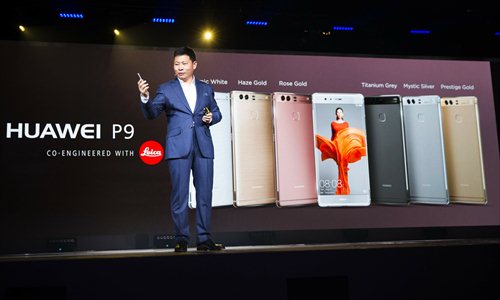HOME >> BUSINESS
Huawei smartphones offer Photo power
By Liu Tian Source:Global Times Published: 2016-4-7 22:43:01
Cooperation with Leica brings technology, brand recognition

Richard Yu Chengdong, CEO of Huawei's consumer business group, introduces the Huawei P9 smartphone during a launch event in London on Wednesday. Photo: CFP
Chinese telecommunications giant Huawei Technologies has launched two high-end smartphones, the P9 and P9 Plus, and experts said on Thursday that the powerful photography function of the new models can help raise the company's brand awareness.
The P9 and P9 Plus - unveiled in London on Wednesday - were co-engineered with the iconic German photography brand Leica Camera AG, according to Huawei.
"Huawei has put great effort into its mobile phones' picture-taking function, which is one of the most important features for high-end smartphones," Wang Yanhui, secretary-general of the industry association Mobile China Alliance, told the Global Times Thursday.
"Cooperation with the established camera brand Leica is not only aimed at functions. It's also directed at the brand strategy, which can help attract more consumers who have demanding requirements for taking photos," said Cheng Jian, editor-in-chief of Beijing-based IT website zol.com.cn.
Leica, a German optics enterprise and manufacturer of Leica cameras, is famous for its high-quality, lightweight range-finder cameras.
"The debut in London shows Huawei is paying close attention to the international market, especially Europe, where Huawei has been doing well," Cheng told the Global Times on Thursday.
In 2015, Huawei got 32 percent of its sales revenue from Europe, the Middle East and Africa, second only to the Chinese market. But that was still far ahead of the US market, which generated just 10 percent of sales, according to the company's 2015 annual report.
Huawei will officially begin to sell the Chinese version of the P9 on April 15, industry Web portal techweb.com.cn reported on Thursday, saying that the price of the domestic version is expected to be lower than that of the international version.
The European pricing of Huawei's P9 and P9 Plus starts at 599 euros ($679) and 749 euros, respectively.
Huawei's mobile phones have seen rapid growth in both the domestic and international markets.
Huawei's mobile phones were the best-selling smartphones in China during the three months ending February, accounting for 24.4 percent of the market, ahead of the iPhone's 22.2 percent, techweb.com.cn reported on Thursday, citing a report from international research consultancy Kantar Worldpanel.
The iPhone's market share in China declined by 3.2 percentage points year-on-year, falling for the first time in two years, according to the report.
Globally, Huawei's mobile phones accounted for more than 10 percent of the market. That put it in third position after Samsung and Apple, tech.qq.com reported on Wednesday, citing statistics from market research company GFK.
"This is because Huawei has its own core technologies, especially leading processor technology," said Wang. "This is rare for domestic mobile phone producers, whose competitive advantages mainly lie in low prices or strong market promotion."
Huawei spent 59.6 billion yuan ($9.21 billion) or 15.1 percent of its gross income on research and development in 2015, according to its annual report.
An article posted on US financial website fool.com in early 2016 said that Huawei is turning into a winner in the smartphone market while Apple is becoming a loser.
Chinese experts took a more guarded view.
"Huawei is gradually catching up to Samsung, but it can't touch Apple, which has a powerful software ecosystem that is unlikely to be undermined by external competitors," said Cheng.
"Huawei's mobile phones have obvious advantages in the function of communications, while Samsung is good at screen production," Cheng said. "As for Apple, Huawei lags behind [the US company]in both smartphone shipments and profits."
The mobile phone sector is still a non-core business for Huawei, whose communication operation business contributed 59 percent of total revenue in 2015, according to its annual report.
But that segment of Huawei's business has encountered problems in the US market.
"The US has very serious resistance to foreign communications operators such as China's Huawei and ZTE," Cheng said. "This is a sensitive area related to national security."
Can Huawei mobile phones, which are products closer to the public and less sensitive than communications products, help the company raise awareness among Americans so as to enter the US market more easily?
Both Cheng and Wang were pessimistic.
"It's really hard due to the sensitivity" of the sector, said Wang.
Posted in: Companies